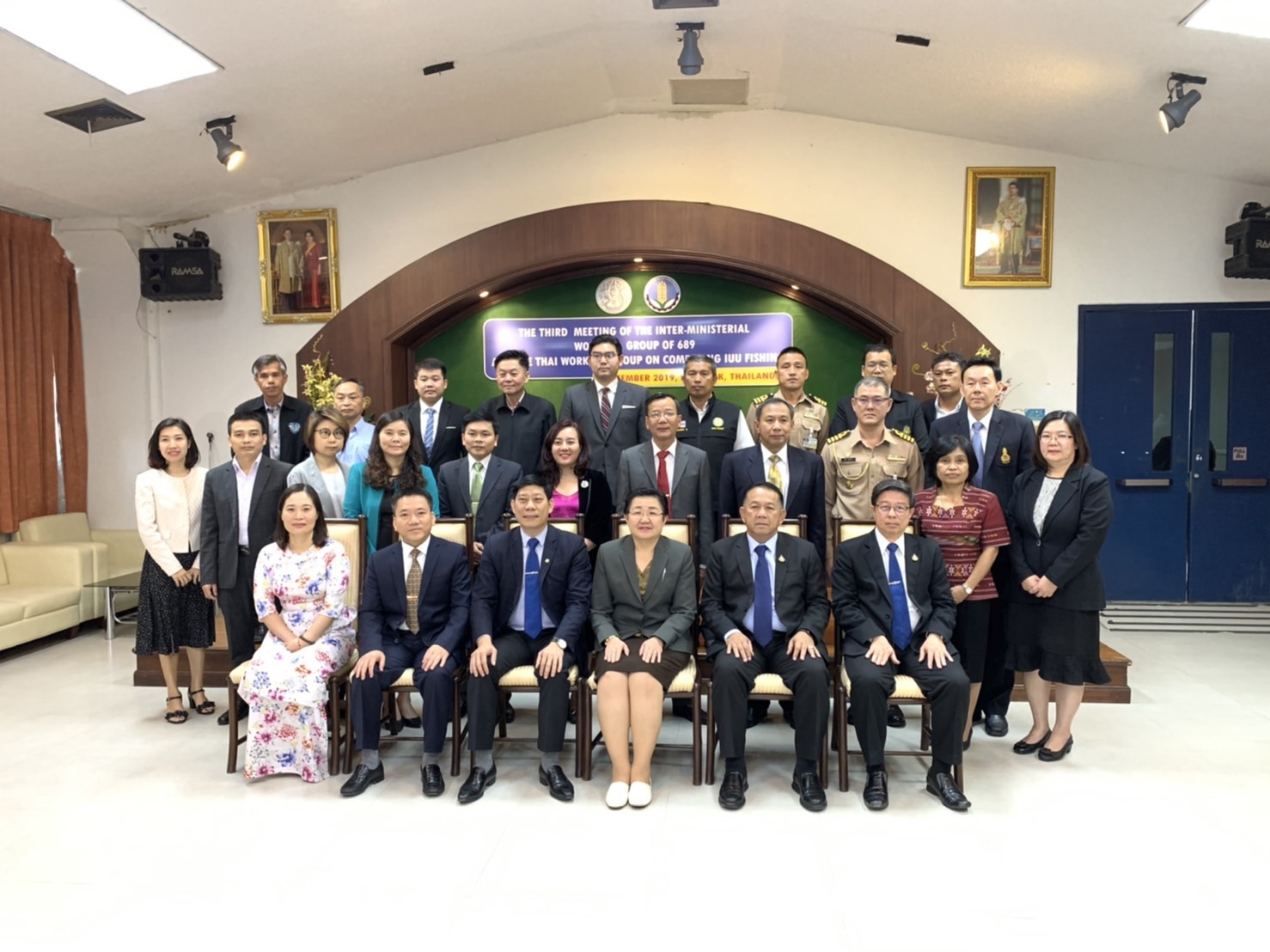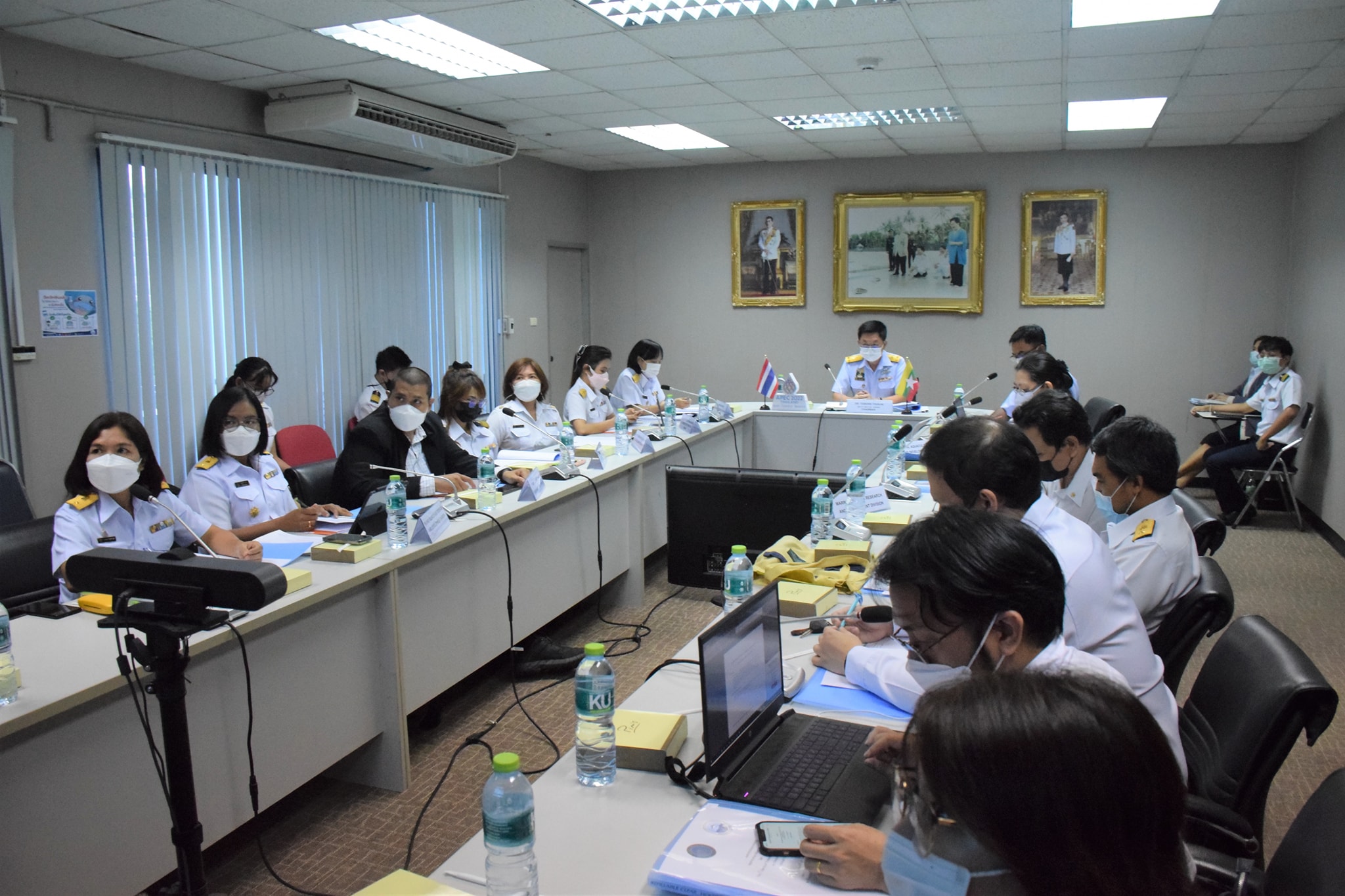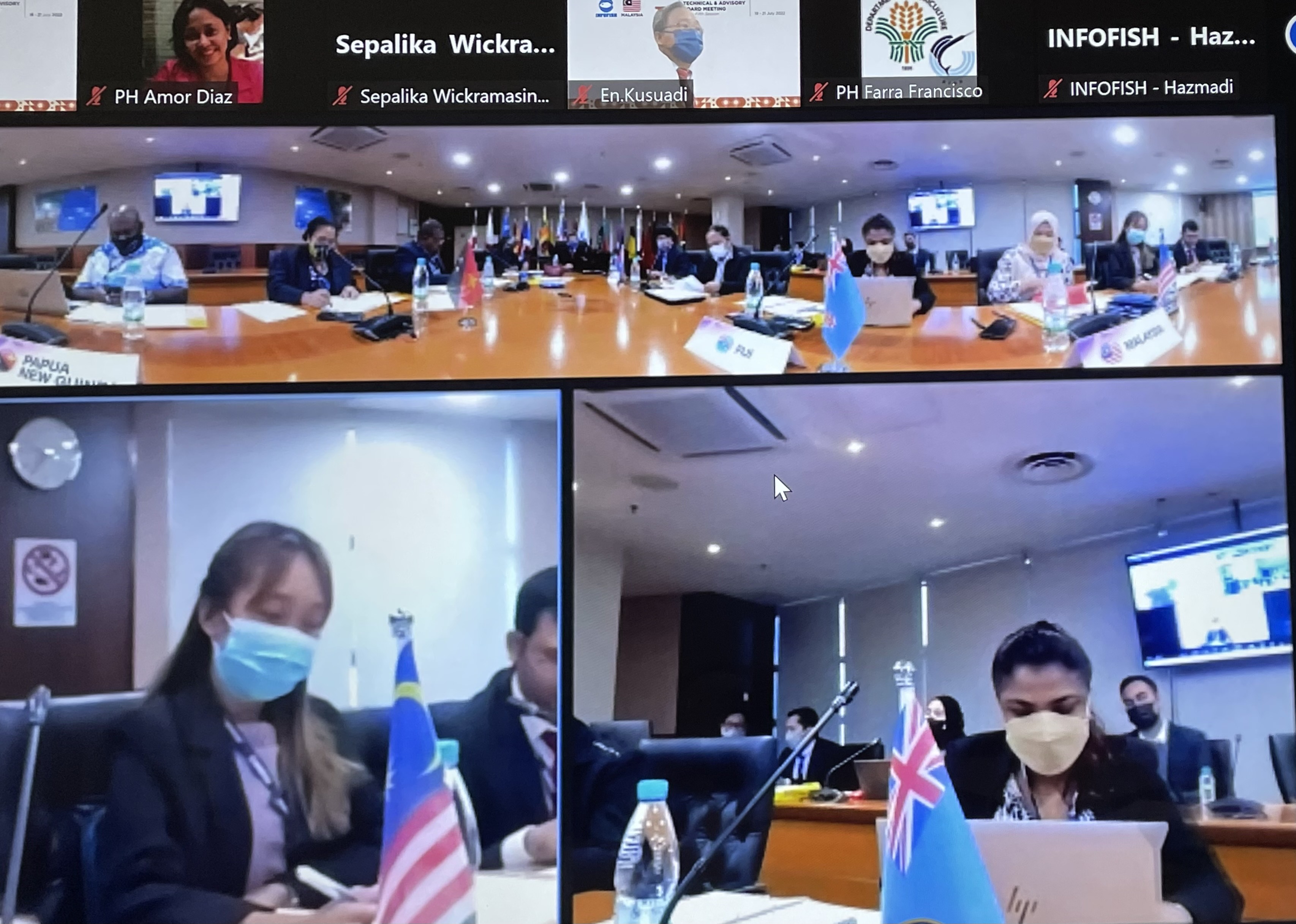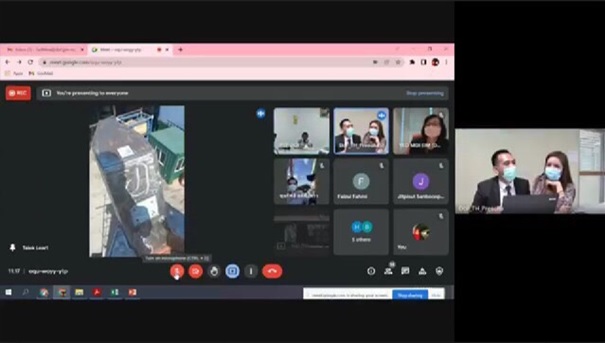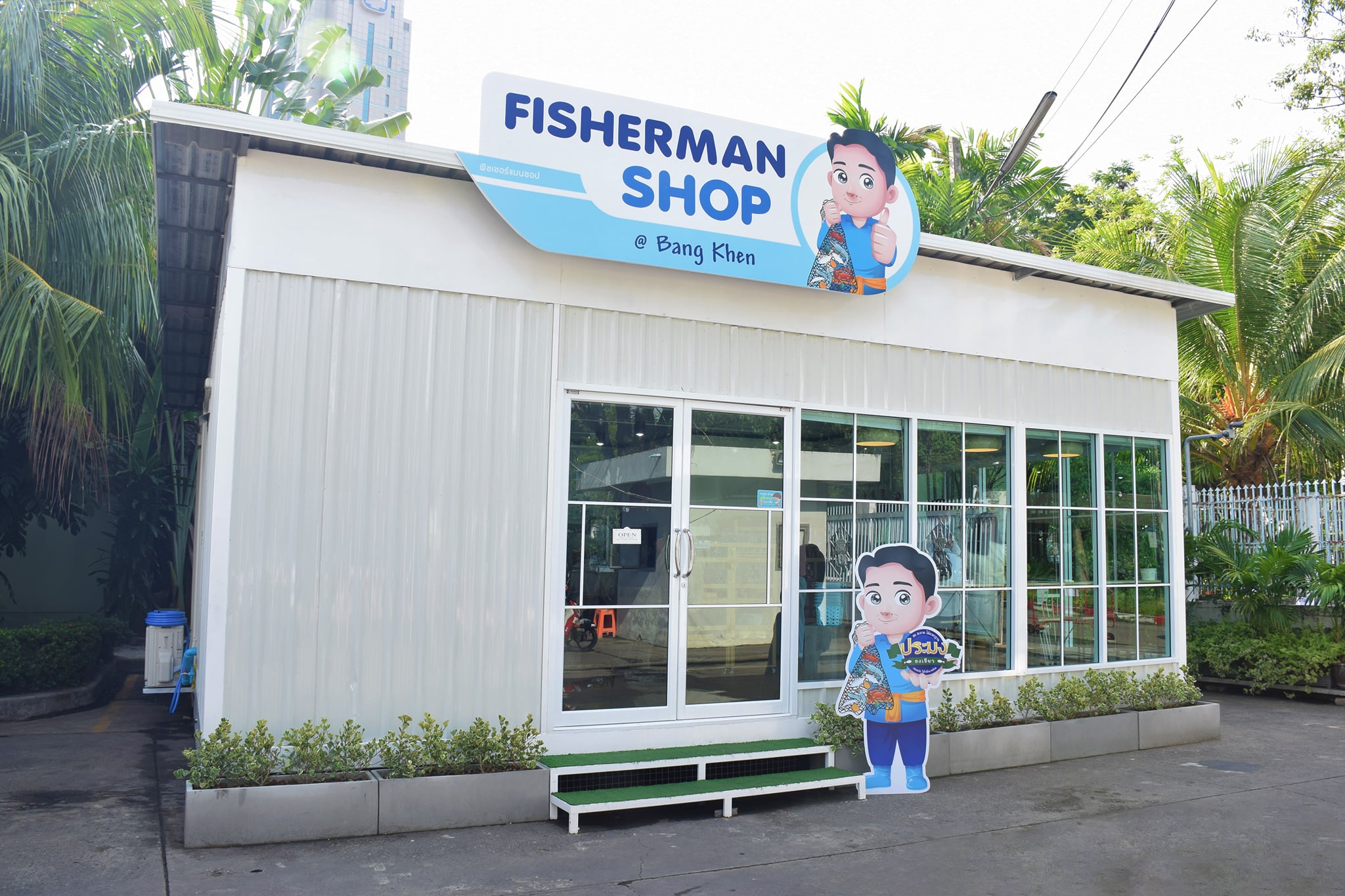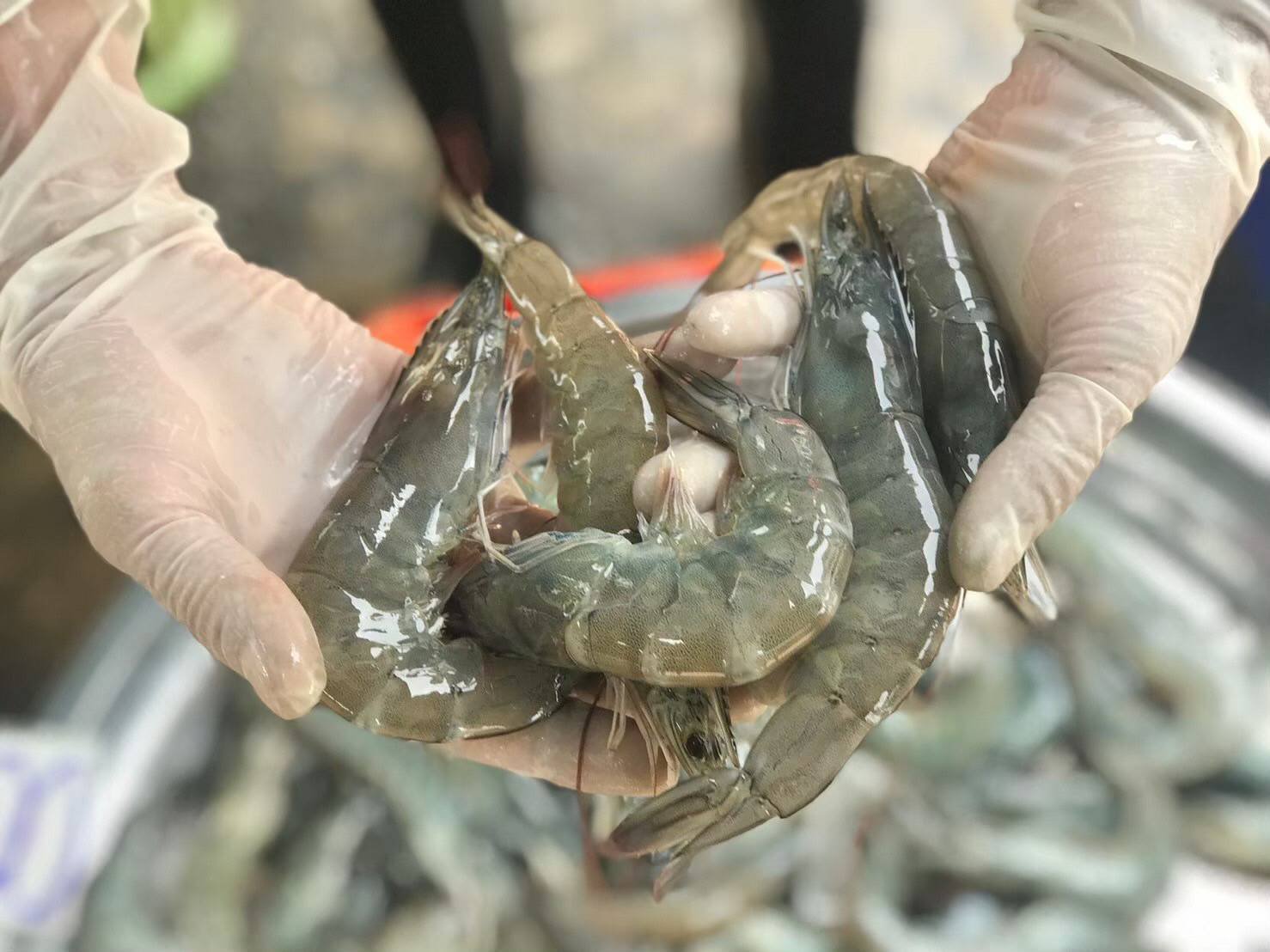Cooperation on Combating IUU Fishing between Thailand and Viet Nam
Cooperation on Combating IUU Fishing between Thailand and Viet Nam Thailand and the Socialist Republic of Vietnam have established the cooperation on Combating Illegal, Unreported, and Unregulated (IUU) Fishing with the aim to address the encroachment of fishing vessels. In 2016, the Thai Working Group for Addressing IUU Fishing between Thailand and Viet Nam was established by an order signed by the Minister of Agriculture and Cooperatives of Thailand. It is chaired by the Permanent Secretary of the Ministry of Agriculture and Cooperatives and comprised of representatives from the Royal Thai Navy, the Thai Maritime Enforcement Command Center (ThaiMECC), the Office of the National Security Council, the Royal Thai Police, the Ministry of Foreign Affairs, the Ministry of Labour, the Ministry of Social Development and Human Security, the Marine Department, the Department of Fisheries and the Bureau of Foreign Agricultural Affairs. The Working Group will be in charge of coordinating with Vietnam's Task Force 689, which consists of representatives from the Ministry of Agriculture and Rural Development, the Ministry of Defense, the Ministry of Public Security, the Ministry of Foreign Affairs, the Office of Government and the National Committee for Search and Rescue of Viet Nam. Three meetings were organized for The Thai Working Group and Taskforce 685 to discuss the tangible steps for preventing the fishing vessel from poaching each other’s waters. The cooperation will take the form of sharing experiences, information, measures, and laws pertaining to IUU fishing. Thailand as the leader in the regional fight against IUU fishing and has been granted a “green card” from the EU will transfer experiences in addressing IUU fishing to Viet Nam. Over the last five years, the Department of Fisheries has not only provided an overview of Thailand's success in combating IUU fishing but also conducted a study visit to the Port-in and Port-out Center (PIPO) and the Fisheries Monitoring Center (FMC) for the Vietnamese delegation to demonstrate the operation of PIPO and FMC, highlighting the monitoring and control of fishing vessels approaching high-risk areas in transboundary waters, the alert given to the owner of the fishing vessel to avoid approaching maritime boarder areas, and the implementation of Port State Measure Agreement (PSMA). Furthermore, expert teams from the Department were dispatched to Viet Nam to provide information, monitor the development of VMS, provide technical assistance, and improve fishing grounds to ensure their sustainability in Ca Mau province by installing an artificial reef. To strengthen cooperation, both countries are working on a Memorandum of Understanding on the exchange of IUU fishing information, which is currently being reviewed before being submitted to the Royal Cabinet for approval and signing. Meanwhile, Thailand and Viet Nam have coordinated and exchanged IUU fishing activities and other data-related information.
Administrator 2022-08-19
Cooperation between Thailand and Myanmar under the Memorandum of Understanding on Fisheries
Cooperation between Thailand and Myanmar under the Memorandum of Understanding on Fisheries In 2017 Thailand and Myanmar established a Memorandum of Understanding on Fisheries Cooperation and this year Thailand hosted the 5th Meeting of the Joint Working Group between Thailand and Myanmar in virtual format on 20 June 2022. Both sides discussed ongoing cooperation activities that emerged from the 4th Meeting of the Joint Working Group between Thailand and Myanmar and how to strengthen fisheries cooperation in various areas, as follows: 1. Project under the Development Plan on Thai-Myanmar Cooperation, 3 years, funded and collaborated by the Thailand International Cooperation Agency (TICA) 1.1 The Project for the Development of Shrimp Farming Demonstration Center in Rakhine State: The Project has been established to improve the existing Shrimp Farming Demonstration Center in Sittwe, Rakhine State, as well as to develop activities to ensure the sustainability of the center such as laying down management measures of the center, disease control, and nursery pond management, including transferring knowledge to smart farmers in Rakhine State. 1.2 A Joint Research Project on Technology Development of Giant Butter Catfish and Hilsa Shad Cultivation Giant Butter Catfish is a Myanmar native species with characteristics similar to Thai Gian Butter but larger in size. The wild population of Giant Butter is currently in a drastic decline, but it is still popular among Myanmar consumers, which causes its price to rise. Myanmar conducted research on Giant Butter Catfish culture in an earthen pond and presented the findings at the working group meeting. Myanmar is pleased to supply giant butter catfish fry to Thailand for further research to facilitate the development of giant butter catfish culture technology. The Department of Fisheries has set up a plan for the project’s activities implementation, which includes transporting fry for research and rearing them as broodstock for breeding in Thailand in accordance with the Institutional Biosafety Committee's procedures (IBC) of Thailand. Hilsa Shad used to be mostly found in the Chao Praya River, and its population has been declining. Hilsa Shad is now extinct in the Chao Praya River, but it can occasionally be found in Songkhla Lake, and the Kra Buri River, there are also found in fresh markets in Bangkok and the south of Thailand. Hilsa Shad are originally from neighboring countries like Myanmar, Indonesia, and Malaysia. Although its flesh has a lot of bones, it is high in nutrients, and expensive as it is an endangered species. The Department of Fisheries conducted a survey and research on the biology of Hilsa Shad in three areas in Thailand: 1) Kra Buri River in Ranong Province, 2) Songkhla Lake in Songkhla Province, and 3) Pattani River in Pattani Province, to collect scientific data required for developing plans of culturing, breeding, and conservation. In the past Hilsa Shad used to be Myanmar's most exported freshwater fish, accounting for 15-20% of the world's captured Hilsa Shad (second only to Bangladesh, which can catch Hilsa Shad for 60% of the world’s catch). At the moment, Myanmar has fundamental information on the biology of Tenualosa ilisha, so Thailand has requested that information be exchanged and that Myanmar should conduct research alongside Thailand, as well as proposed a study on the best way to transport Hilsa Shad to Thailand. 2. Cooperation in preventing IUU fishing The meeting exchanged information regarding transshipment ships flying the flag of Myanmar that was berthed in a Thai port. The Myanmar side was requested to take into account providing the Thai side with the list and details of the transshipment vessels that are granted with an annual license for inspection under the Port State Measures (PSM). The Myanmar side was also invited to join the ASEAN Network for Combating IUU Fishing Interactive Platform (AN-IUU Interactive Platform) to exchange and share information and to strengthen regional cooperation in the fight against IUU fishing that the Myanmar side is pleased to support. 3. Proposal for transferring the status of Siamese crocodile from List of Appendix 1 to List of Appendix 2 of the CITES The Department of Fisheries submitted to the CITES Secretariat the complete proposal for the transfer of the status of Siamese crocodile from List of Appendix 1 to List of Appendix 2 of the CITES for presentation at the 19th CITES meeting to be held in November 2022. If the Thai proposal is adopted, the Siamese crocodile market will be expanded and will lead to the professional development of crocodile farmers in Thailand. Thailand is pleased to provide additional data to Myanmar for consideration in support of the Thai proposal to transfer the status of Siamese crocodiles.
Administrator 2022-08-19
The 35th Meeting of INFOFISH Technical and Advisory Board (TAB)
The 35th Meeting of INFOFISH Technical and Advisory Board (TAB) The 35th Meeting of INFOFISH Technical and Advisory Board was organized from 19-21 July 2022 through a virtual format. The meeting was chaired by Mr. Kusuadi bin Sallih from Malaysia, and Ms. Shirlene Maria Anthonysamy, the director of INFOFISH, served as the meeting secretariat. Participants included representatives from the INFOFISH Member Countries: Bangladesh, Cambodia, Fiji, Malaysia, Republic of Maldives, Papua New Guinea, Philippines, Sri Lanka, and Thailand, as well as INFOFISH officers and observers from the FAO and World Sustainable Organisation (WSO). The objective of the meeting was to bring together representatives at the technical level of the member countries to review the INFOFISH implementation report for the years 2021-2022. They were also encouraged to consider the Work Program 2023. In addition, the Secretariat presented the "Technological Developments and Innovations in Aquaculture" as well as post-harvest activities related to the entire production chain, including the report on the status and trends of the world's main fishery product market. During the meeting, Thailand proposed the following activities to be included in the Work Program 2023: 1) Preparing the Member Countries through sharing knowledge and experiences for the implementation of the Marine Mammal Protection Act (MMPA), to comply the USA’s requirements in exporting fishery products to the US, 2) Sharing information and knowledge among Member Countries on collaboratively data collection and management of transboundary and migratory species under the Marine Stewardship Council (MSC) requirement for sustainable fisheries, 3) Arranging a workshop on the identification of Sharks and Rays listed under CITES based on their genomics as well as the utilization of their parts for commercial purposes, 4) Arranging a workshop on sharing knowledge and experience in fishery management of billfish species and their conservation, 5) Arranging a workshop on technology and innovation to enhance productivity and reduce costs in shrimp farming for increase trade competitiveness. The meeting took note of Thailand’s proposal and assigned INFOFISH to explore the possibility of implementing the proposal.
Administrator 2022-08-19
Cooperation between Thailand and Malaysia in the virtual inspection of suspected fishing vessels engaged in IUU fishing
Cooperation between Thailand and Malaysia in the virtual inspection of suspected fishing vessels engaged in IUU fishing According to five suspected foreign fishing vessels that entered Thai waters without permission, Thailand by the Department of Fisheries has requested the cooperation of ASEAN member states: Indonesia, Malaysia, and Viet Nam to jointly investigate the nationality of those vessels. The Department of Fisheries coordinated with Malaysia for a joint inspection and investigation of the five vessels’ nationality, but due to restrictions caused by the COVID-19 pandemic, Malaysian officials were unable to visit Thailand to inspect the vessels. Both sides considered and agreed to convert the on-site inspection into a virtual one and the Malaysian side cooperated fully in this regard. Thai officials from the Department of Fisheries, the Marine Department, the Customs Department, and local officials jointly inspected the identification of the fishing vessels, including QR codes, tin plates, hammer decals, engine serial numbers, and VMS. Thai and Malaysian officials exchanged information on the prosecution of each country's illegal fishing offenders to facilitate legal action against the fishing vessels and individuals involved, including sharing experiences that will strengthen cooperation to prevent similar incidents in the future. It can be said that the co-inspection between Malaysia and Thailand through virtual format this time may pave the way for the development of a system to address IUU fishing with other ASEAN members.
Administrator 2022-08-19
Fisherman Shop @ Bang Khen
Fisherman Shop @ Bang Khen The COVID-19 outbreak has had an impact on economy and tourism, resulting in significantly decreasing buying power, particularly for local products, affecting small-scale fishers as local entrepreneurs. H.E. Dr. Chalermchai Srion, the Minister of Agriculture and Cooperatives recognizes the limitations of local fishery products from artisanal fishers who are unable to access digital markets and lack various distribution platforms. To solve this problem, the Ministry imposes a policy to build a product distribution center such as local markets, department stores, retail shops, and gas stations in every 23 coastal provinces, including 17 provinces along the Gulf of Thailand Coast and 6 provinces along the Andaman Sea Coast. The Department of Fisheries (DOF) under the Ministry of Agriculture and Cooperatives has carried out the policy by supporting suitable selling outlets for the artisanal fishers to simultaneously enhance their salesmanship, processing, and packing skills. This not only increases publicity for the products but also gains value and precious images of the products in the future. This leads to the initiation of the project “The artisanal fishery product distribution to consumers at Fisherman Market”. Fisherman market events located in both central and regional areas have been remarkably successful to help and enhance the products of artisanal fishers. Subsequently Director-General of DOF, Mr. Chalermchai Suwannarak assigned Fisheries Industrial Technology Research and Development Division to establish a welfare shop of the Department of Fisheries named "Fisherman Shop @ Bang Khen". The purpose of this shop is to upgrade the distribution channels of artisanal fishery products and develop the marketing skills of the fishers. Also, Fisherman Shop is the center of public relations and branding awareness for farmers, artisanal fishers, micro and small-scale enterprise groups, and entrepreneurs under the supervision of the DOF. Moreover, Fisherman Shop @ Bang Khen could support and enhance value-added product and package development as well as logistics and transportation to ensure that the products are fresh, clean, standardized, safe, and environmental-friendly by using the “Green Flag Fisheries” symbol on the products selling at Fisherman Shop, thereby leading to improve marketing values of the products.
Administrator 2022-08-04
Thai shrimp is safe without residues through a production process with standards, safety, and environmental friendliness to enhance consumer trust
Under the Royal Ordinance on Fisheries, B.E. 2558 (2015) and its amendments, B.E. 2560 (2017), the Department of Fisheries has propelled the Thai marine shrimp industry for years to control the production process of marine shrimp from downstream to upstream. This is to assure compliance with international standards, customer safety, environmental friendliness, and the ability to trace back in every production process. This endeavor aims to boost consumer and importing country confidence. In addition, the Department of Fisheries has prioritized labor in the marine shrimp industry, both on farms and at processing plants, by adhering to Good Labor Practice: GLP. This means that the Thai marine shrimp industry does not engage in child labor abuse, slave labor, or forced labor because the Department values labor welfare protection. As a result, consumers can rely on Thai marine shrimp produced for domestic and international markets, including export that are of high quality, meet international standards, and are safe to consume with environmentally friendly and responsible practices. Given the challenges of the marine shrimp epidemic Thailand encountered, which has resulted in a drastic decrease in marine shrimp production, the Ministry of Agriculture and Cooperatives recognizes the crucial role of marine shrimp products and, as a result, establishes an urgent policy to restore Thailand's marine shrimp production in order to ensure that it will reach 400,000 tons by 2023. The Department of Fisheries, as the competent agency, has directed the management plan for marine shrimp production throughout the whole chain to ensure that the goal setting is met through integrated work with all stakeholders, including the government, farmers, private sector, and academic institutes. These agencies have pushed all hatcheries to produce marine shrimp juveniles that are high in quality, disease-free, and residue-free, as well as encouraging all farms to have GAP certification and restore degraded marine shrimp areas while promoting and expanding marketing channels to accommodate increased marine shrimp production through the promotion of marine shrimp consumption in domestic and international markets. Apart from reviving Thailand's marine shrimp production, this policy intends to provide job stability for marine shrimp farmers and related industries. Based on the knowledge and experience that Thai farmers have accrued over a long period of time in developing and improving marine shrimp farming, it is important to keep up with the situation and increase the effectiveness of marine shrimp production through proper advice and close control of the government sector. This will guarantee that marine shrimp production will meet the standard, be secure, and be free of residues to reassure consumers and maintain a positive image for Thailand.
Administrator 2022-06-28


